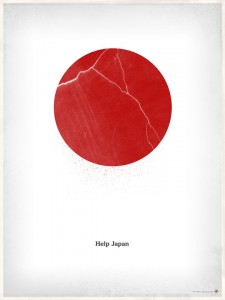I lived in Japan from 2001-2002, working in Saitama prefecture, Hidaka City as an Assistant English Teacher on the Japan Exchange and Teaching (JET) Program.
Although I was only in the country for one year, my year in Japan was one of the most influential of my life. I cannot imagine a better way to spend the first year out of college, and I’d recommend it to anyone who is interested in living abroad and experiencing a unique adventure.
I’ve been quite preoccupied by the news from Japan since the March 11 earthquake, the tsunami that followed, and now the frightening nuclear crisis. I’m hoping for the best. I’ve been in contact with my friends in Tokyo; fortunately everyone I know in Japan (and their families) are safe. My heart goes out to the victims and their families. I can’t imagine the devastation that has come crashing down on these people.
I’ve been thinking a lot about the Japanese earthquake and how it has reminded me of certain aspects of Japan that I really admired.
I’m not an expert on Japanese culture, but I have some very good friends there and the place is close to my heart. So here are some of my impressions of what I’ve been reading in the aftermath of the Japan earthquake:
Crises amplifies the strengths and weaknesses of every individual/organization/culture.
I’ve been really impressed by what I’ve seen from the Japanese people in responding to this earthquake – lots of patience, calmly waiting in lines, no panic, no looting, no disorder. While Japan is not a perfect, crime-free place, they do tend to have a very safe and orderly society. Japan tends to have a high level of social cohesion and “team spirit.” People look out for the interests of the group before they look out for their own self-interest. Japan is very different from America in this way, when compared to the American spirit of go-it-alone, rugged individualism. Japanese culture is good at accepting the things that cannot be helped – “shikata ga nai” is the expression in Japanese for “it can’t be helped.” This is SO different from America. Americans want to fix everything. We never want to concede defeat. We tend to believe that we are all protagonists in our own unfolding story (whereas collectivist cultures like Japan put more importance on each individual person playing their appropriate role in their group, family, company, society – there is more of a context for how you relate to your fellow people and your society). In America, we have a very hard time accepting that some things in life are just inexplicably hard, tragic, impossible, unable to be helped. Japan has a better cultural sense for the transience of things and the fragility of life. (Of course, when this cultural trait goes too far, it becomes hopeless fatalism – which is counter-productive. But in many ways, I think Japanese culture is better adapted to dealing with tragedies and natural disasters.)
Unfortunately, the crisis has highlighted some weaknesses of the Japanese system as well – in particular, Japan has a hard time with delivering bad news. Until fairly recently, even cancer patients in Japan would not be told the full truth about their diagnosis, in order to spare their feelings/keep them from being distressed. We’ve seen this cultural tendency in the Japanese government’s public statements about the nuclear crisis. It’s been hard to get transparent, reliable information about the nuclear situation, either from the Japanese government or from the Tokyo Electric Power company that runs the stricken nuclear plant. Much of the public statements from the Japanese government have been ambiguous and hard to decipher. This is unfortunately a weakness of the Japanese system of government – there is often too much deference given to authorities, bureaucracies and entrenched interest, and not enough transparency to the public. (Gosh, does that sound familiar, America? America is also far from perfect in this regard.)
I’m surprised it wasn’t worse
Japan is prone to earthquakes. When I lived there, I would occasionally be awoken in the night by the sound of teacups rattling in the cupboards – the walls of my apartment building would wobble. Most of the time the shaking only lasted a few seconds, but it still was unsettling to a guy from the Midwestern U.S., where earthquakes almost never happen.
I remember reading about the Tokyo earthquake of 1923, where over 100,000 people died. Japan had a terrible earthquake in Kobe in 1995 where over 8,000 people died. Even with all the modern building codes and advanced construction techniques of a wealthy country like Japan, there’s only so much that can be done to protect human lives against the worst earthquakes.
So in a way, despite the terrible loss of life, part of me was surprised that the Japan earthquake and tsunami haven’t been even more deadly.
Of course, Tokyo is the world’s largest city, and it is particularly vulnerable to earthquakes. Most of the world’s population lives close to fault lines – we are all “whistling past the volcano,” so to speak. Most likely within our lifetimes, major earthquakes will hit some of the world’s most populous cities. It’s not a matter of “if” but “when.”
Let’s Help Japan
I know, Japan is a wealthy country – but they still could use our help. I donated to the American Red Cross Japan earthquake relief fund (any unused proceeds will be used to help with other disaster relief efforts around the world). Every dollar counts. If you’ve read this far, will you consider making a small donation?
At times like these, we should all feel lucky just to be alive, to have family and friends who love us, to have food in our bellies and money in our pockets. Let’s give a little bit to help people who are facing terrible challenges – in Japan or elsewhere in the world.
Here is the Red Cross donation site: http://american.redcross.org/site/PageServer?pagename=ntld_main&s_src=RSG000000000&s_subsrc=RCO_Donate_OnlineGiving
Please give what you can.





